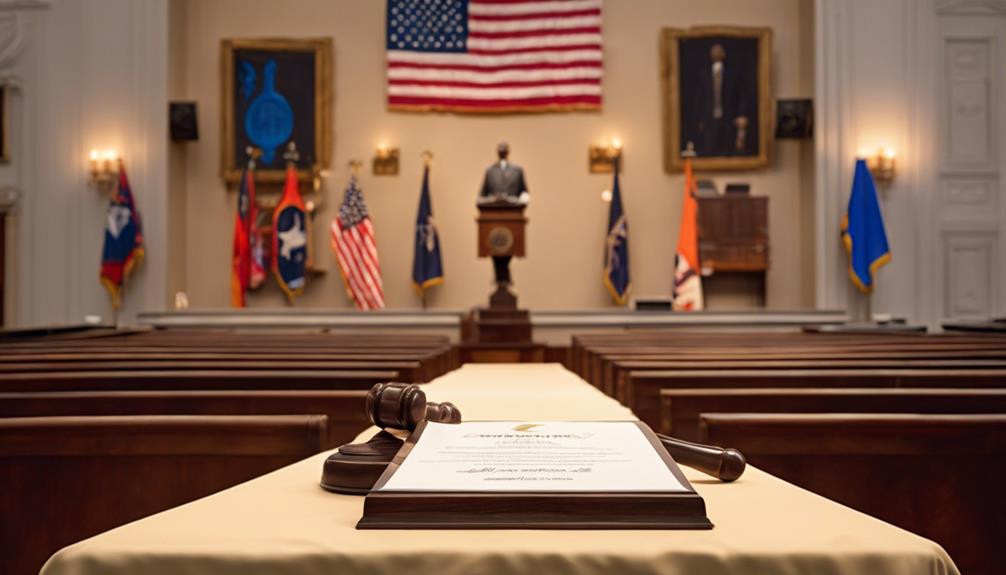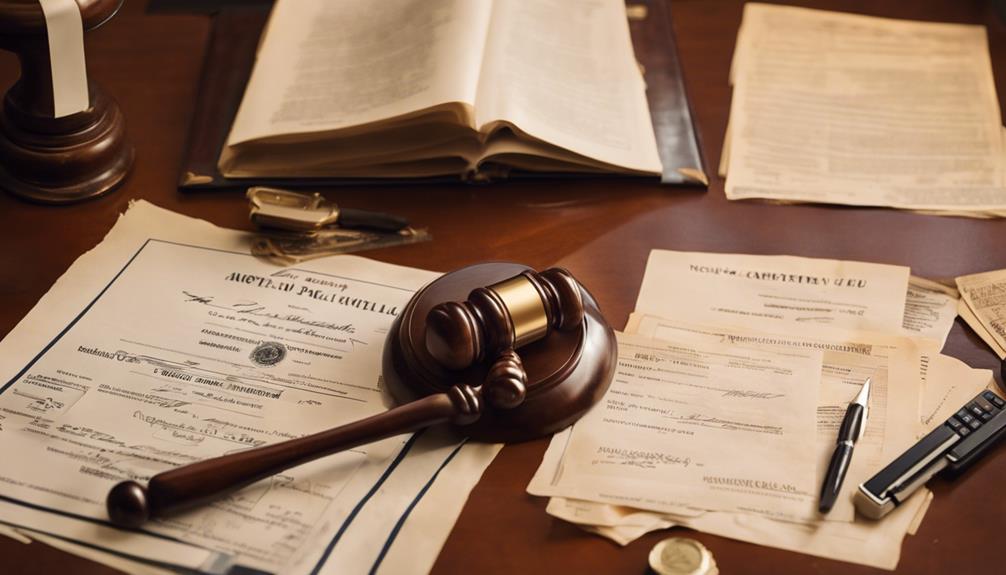If you're an auctioneer in Virginia, understanding the Virginia Auctioneer Bond is essential for your business. This bond not only safeguards your clients but also boosts your credibility in a competitive market. You might be wondering what steps are involved in securing this bond and how it impacts your operations. The nuances of the bonding process can be complex, and the costs can vary significantly. To fully grasp what's at stake and how to navigate the requirements, you'll want to explore the details further.
Understanding Auctioneer Bonds

Auctioneer bonds are essential tools that ensure compliance and protect both auctioneers and their clients. These bonds act as a safety net, guaranteeing that auctioneers will adhere to the laws and regulations governing their profession. When you understand auctioneer bonds, you realize they're not just paperwork; they're a promise of integrity and professionalism.
These bonds promote fair competition by enforcing the same regulatory standards across the industry.
As an auctioneer, you'll need to secure a bond to operate legally. This bond typically requires you to pay a premium, which is a small percentage of the total bond amount. The bond amount varies by state, but it's designed to cover potential losses incurred by clients due to your actions or negligence.
If you fail to comply with auction regulations, your clients can file a claim against the bond, seeking compensation for their losses.
It's crucial to choose a reputable bonding company that understands the auction industry. They'll help you navigate the application process and ensure you meet all the requirements.
Importance of the Virginia Auctioneer Bond
In Virginia, obtaining an auctioneer bond is vital for anyone looking to operate legally and ethically in the industry. This bond serves as a guarantee that you'll adhere to the laws and regulations governing auctioneering, similar to how Illinois Surety Bonds ensure compliance in various industries.
When you secure this bond, you're not only protecting yourself but also your clients and the public. It shows you're committed to fair practices and transparency, which can help you build trust and credibility in a competitive marketplace.
Without a bond, you risk facing legal consequences, including fines or even losing your license. Clients may hesitate to work with someone who isn't bonded, which can significantly affect your business.
Moreover, the bond provides a financial safety net; if you fail to fulfill your obligations, it can cover any claims made against you, offering peace of mind to both you and your clients.
In essence, the Virginia auctioneer bond is more than just a legal requirement—it's a critical component of your professional reputation. By obtaining this bond, you're laying the groundwork for a successful, trustworthy auctioneering career that benefits everyone involved.
Requirements for Obtaining a Bond

Securing a Virginia auctioneer bond involves meeting several key requirements that ensure compliance and professionalism in the industry.
First, you must hold a valid auctioneer license issued by the Virginia Department of Professional and Occupational Regulation (DPOR). This license confirms that you've completed the necessary education and training in auctioneering.
Next, you'll need to provide a completed bond application form. This form typically includes your personal information, business details, and the specific bond amount required by the state. Be prepared to supply any additional documentation that may support your application.
Additionally, you'll undergo a background check. This process helps assess your integrity and financial responsibility, so it's essential to have a clean record.
Some surety companies may also require credit checks to evaluate your creditworthiness.
Costs Associated With the Bond
The costs associated with obtaining a Virginia auctioneer bond can vary significantly based on several factors. Typically, you can expect to pay a premium that ranges from 1% to 15% of the bond amount.
For example, if the bond requirement is $10,000, your premium could be anywhere from $100 to $1,500, depending on your credit score and the surety company you choose.
Your credit history plays a crucial role in determining your exact costs. If you have a strong credit score, you'll likely pay a lower premium. Conversely, if your credit is less than stellar, you might find yourself on the higher end of that range.
Other factors that can influence your bond cost include the financial stability of your business and how long you've been in the auctioneer industry.
Additionally, there might be other fees to consider, such as application fees or service charges. It's important to shop around and get quotes from multiple surety companies to find the best rate.
Understanding these costs will help you budget effectively as you move forward with your auctioneer bond requirements.
The Bonding Process Explained

Navigating the bonding process for a Virginia auctioneer bond is straightforward, but it requires attention to detail. First, you'll need to gather the necessary documentation. This typically includes your business information, personal identification, and any relevant financial records. Make sure everything is accurate and up-to-date, as discrepancies can delay the process.
Next, you'll want to choose a surety company. Research different providers to find one that specializes in auctioneer bonds and offers competitive rates. Once you've selected a surety, you'll complete an application. This application will require you to disclose your financial history and business practices, so be prepared to answer questions about your experience and operations.
After submitting your application, the surety company will evaluate your information. They may conduct a credit check to assess your financial stability. If approved, you'll receive a quote for the bond premium.
Once you agree to the terms and pay the premium, the surety will issue your bond. Finally, you'll file the bond with the appropriate Virginia authority, completing the bonding process and allowing you to operate legally as an auctioneer.
Consequences of Not Having a Bond
Operating as an auctioneer without a bond can lead to significant legal and financial repercussions. Without that bond, you expose yourself to potential lawsuits from clients who feel wronged by your actions.
If a dispute arises, having no bond means you won't have financial backing to cover any claims, which could result in costly legal battles that drain your resources. Furthermore, securing a surety bond is essential for ensuring compliance with state regulations and protecting your business interests.
Moreover, operating without a bond can tarnish your reputation in the industry. Clients and businesses often look for auctioneers who are bonded, as it demonstrates credibility and professionalism.
If potential clients see you lack a bond, they might question your reliability and integrity, causing you to lose out on valuable contracts.
Additionally, you could face fines or penalties from regulatory authorities for failing to meet state requirements. These fines can add up quickly and put a significant dent in your finances.
Benefits of Being Bonded

Being bonded offers a multitude of advantages that can significantly enhance your auctioneer business.
First and foremost, it builds trust with your clients. When potential customers see that you're bonded, they feel more secure knowing that you're financially backed and accountable for your actions. This trust can lead to more contracts and repeat business.
Additionally, being bonded can set you apart from your competitors. Many auctioneers may not have the same level of credibility, making your business more appealing to clients.
You'll also gain access to a wider range of opportunities, as some clients or organizations require auctioneers to be bonded before considering their services.
Moreover, having a bond can protect you against financial losses. If you accidentally mismanage funds or fail to fulfill contractual obligations, your bond can cover these losses, ensuring you won't face severe financial repercussions.
Tips for Auctioneers in Virginia
Three essential tips can help you thrive as an auctioneer in Virginia.
First, familiarize yourself with local laws and regulations. Virginia has specific requirements for auctioneers, including licensing and the necessity of maintaining your auctioneer bond. Staying compliant won't only protect you legally but also enhance your reputation in the community.
Second, develop strong relationships with your clients and bidders. Building trust is crucial in this industry. Always communicate openly and professionally, ensuring that clients feel valued and bidders feel respected. This can lead to repeat business and positive word-of-mouth referrals.
Lastly, continuously refine your auctioneering skills. Attend workshops, join professional organizations, and seek mentorship from experienced auctioneers.
The more you invest in your professional development, the more effective and confident you'll become. This commitment to growth will set you apart from competitors and enable you to provide exceptional service.
Conclusion
In summary, securing a Virginia Auctioneer Bond is essential for your auction business. It not only protects your clients but also boosts your credibility in the marketplace. By understanding the requirements and costs involved, you can navigate the bonding process smoothly. Remember, being bonded isn't just a legal obligation; it's a smart business move that builds trust and sets you apart from the competition. Don't overlook this crucial step in establishing your auction career in Virginia!


